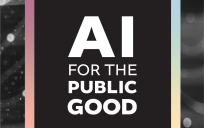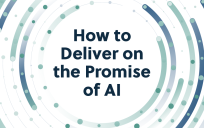 Today marks the final post in my series on AI in government, co-written with several of my friends and colleagues. Together we’ve shared our personal perspectives informed by our professional experiences on the promise and practicalities of the burgeoning techniques and technologies associated with artificial intelligence. In this post I’ll review our journey and talk about how I see the future of AI shaping up for society and government.
Today marks the final post in my series on AI in government, co-written with several of my friends and colleagues. Together we’ve shared our personal perspectives informed by our professional experiences on the promise and practicalities of the burgeoning techniques and technologies associated with artificial intelligence. In this post I’ll review our journey and talk about how I see the future of AI shaping up for society and government.
Our Journey through the AI Landscape
We began our journey looking at how AI can help tame government backlogs and from there proceeded to look at many different perspectives on AI, from better training data, to the personal impact of interacting with AI for digital citizen services, to AI for computer vision and knowledge through natural language, to AI and ethics, AI as a co-worker and more.
All told, we’ve gone far and wide to provide you with perspectives on the possibility and promise of AI applied to government services, but today I’d like to talk about where we are today and what I hope the future holds for a technology that in many ways is still in its infancy.
Much like former technology waves, AI has become an almost required capability in every piece of software on every project. This has led to some unsurprising levels of confusion as technology and business leaders try to sort through claims on true AI capabilities vs. marketing labels. If every piece of software is AI software, then how can we tell if any of them are any good?
An Industry in the Early Stages of Maturity
I’m hopeful that as the industry matures, standards for assessing the quality and usefulness of AI capabilities will emerge that will help guide evaluations and selection processes so that we’re not just believing everything we hear. Early signals have shown us that people are asking for AI claims to be backed up by demonstrated achievements, with an increasing emphasis on explain-ability. The desire for AI transparency has its roots in ethics and bias reduction, but it goes back to our skeptical human nature that asks people to “show their work”. We want to believe in the promise of AI, but we know there are no shortcuts to knowledge. It’s clear that some vendors understand this, as they search for industry standard benchmarks that help us sort through the AI clutter.
I’m also looking forward to structured and rigorous training being developed for AI engineers and developers. Much in the same way we certify our civil engineers who build and maintain the bridges and roads we rely on every day; we’ll want to know that the AI we work with on a regular basis has been built in a solid and fundamentally trustworthy way. I expect we’ll see more of this as the academic system builds out broad-based curriculum for everyone who builds, designs and works with AI systems.
What will the Future Hold for AI?
This level of professionalism will become even more important as AI-capable assistants arrive in the hands of every citizen; enabling them to be more productive while unlocking their ability to leverage an increasing capable AI infrastructure of services. We already see how basic, baseline AI capabilities can help us in areas of vision assistance, language assistance and basic tasking. As we use AI to automate more of our routine, we gain the freedom to exploit our imagination even further.
Two weeks ago I attended a business and technology conference on AI that showed me a vision of that future. One where AI clears away the clutter and provides me with new areas to explore, new visions to create, and new ways to improve the world. As AI gets us to that level, I look forward to what we’re all able to do in that world of possibility.
I’d like to thank readers for joining us on this series, and I invite you to continue this conversation with me and my colleagues on social media via @ddelmoli on Twitter and on LinkedIn.
Dominic Delmolino is a GovLoop Featured Contributor. He is the Chief Technology Officer at Accenture Federal Services and leads the development of Accenture federal’s technology strategy. He has been instrumental in establishing Accenture’s federal activities in the open source space and has played a key role in the business by fostering and facilitating federal communities of practice for cloud, DevOps, artificial intelligence and blockchain. You can read his posts here.





Great final piece, Dominic! I’m excited for the future of AI, and I’m in full agreement with you that the high level of professionalism and quality required in the next phase is crucial.